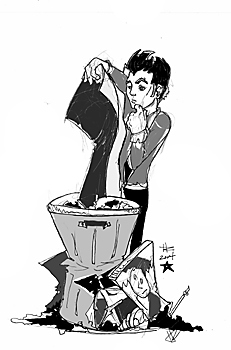
Illustration by Holly Randall
|
|
By Dillon Fishman
Arizona Daily Wildcat
Tuesday, January 25, 2005
Print this
What is art? "Art is the most passionate orgy within man's grasp," said Jean Dubuffet. Artist Edgar Degas concurred: "Art isn't something you marry. It's something you rape." Regardless of how one conceptualizes art, one word that rarely defines it is profitability. Indeed, the UA's arts programs are once again making headlines because of funding woes.
The Arizona Daily Wildcat reported last week that UApresents, is dangerously underfunded. Lack of theater ticket sales has left UApresents scrambling for money and barely staying afloat with a recent $50,000 anonymous private donation. The crisis is common. UA arts programs - including dance, music, performing arts and visual arts - chronically suffer from money shortages. But for all the programs bring, it's time for UA administrators to commit to a level of funding that will permanently sustain such programs.
At a recent commencement address, Bowdoin University's president highlighted in detail the importance of sustaining the arts. Echoing others throughout academia, he recalled that art is ubiquitous and influential in every culture. The arts even predate formal academic institutions and written language. In fact, early performing arts served as a means of teaching and preserving history. Today, the arts continue to perform needed educational functions - encouraging creativity, fostering imagination and enhancing intellectual diversity.
Conversely, the standard justification for not funding art programs is that they don't produce sufficient revenue on their own. Opponents of funding the arts reason that rudimentary economics dictate that if the arts are not in demand, it is irrational to continue to supply them. This type of reasoning is troubling, however, because it fails to understand the university's full mission.
Public universities are, by definition, nonprofit corporations. Universities aspire to greater ends than merely maximizing capital. A program's educational worth isn't determined by the dollar signs it generates on the accountant's ledger. Educational value comprises many intangible attributes. The arts contribute many of those intangibles and are a vital part of the education process.
And, to borrow a phrase from the same economists that critics of the arts cite, the arts bring many positive externalities that aren't reflected in ticket sales. For example, few academic programs rival the arts in being solicitous to creativity and imagination, traits that are hugely beneficial to all academic disciplines. Albert Einstein reminded us that "Imagination is more important than knowledge." The arts celebrate creativity through literary works, stage performances and visual media. This creativity transfers to the engineer's notepad and the scientist's laboratory. Renowned inventors such as Thomas Edison have testified to the value of imagination in inspiring their technological breakthroughs - contributions that have literally revolutionized society.
Likewise, art contributes to the university's core goals of encouraging individuality and improving understanding of people. For instance, classical theater masterpieces such as "Oedipus Rex," "Romeo and Juliet," and "Othello" teach timeless messages about people and human nature.
Relatedly, debate, dialogue and the free exchange of ideas lead to social and scientific progress and the eventual discovery of truth. Academia exists to facilitate such progress and discovery. Indeed, so important are those goals of unfettered debate and the discovery of truth that the authors of our Constitution penned the First Amendment chiefly to protect and preserve them from the vicissitudes of public opinion. Like unpopular literary works, art is a conduit for personal expression and novel contributions to the marketplace of ideas. The university, in turn, stands as an important public forum in which artists can promulgate those ideas. Because of the human propensity to reject what is unfamiliar, in art as in other fields, the university has a special responsibility to promote and defend that art, even when society rejects it as unpopular.
The arts also help us to surmount individual and cultural differences - priorities that the university must embrace. Music requires no interpreters and is a language universally understood. Resonating in countless symphony halls, the sounds of Mozart's "Eine Kleine Nachtmusik" have entranced audiences from Germany to Tucson. The cryptic smile on "Mona Lisa" captivates viewers worldwide, whatever their background and upbringing.
Funding art is also pragmatic: Recent research demonstrates that educating students in art and music leads to better performance on SAT and other standardized tests.
In sum, among other things, the arts contribute to the university's indispensable goals of attaining diversity and social progress. The arts merit adequate funding from the UA administration.
Perhaps one perennial authority, Kermit the Frog, stated it best: "How important are the visual arts in our society? I feel strongly that the visual arts are of vast and incalculable importance. Of course I could be prejudiced. I am a visual art."
Dillon Fishman is a third-year law student. He can be reached at letters@wildcat.arizona.edu.
